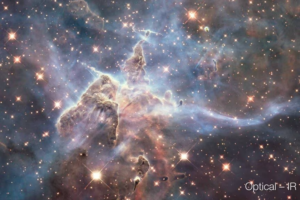The dogwood tree outside my bedroom window is blossoming.
When I open the drapes in the morning and look out from my second-story window, I see hundreds of small white flowers. I first noticed the buds opening on Easter morning, and my first thought was:
Praise the Lord, Christ has risen.
I sensed what the Jesuit poet Gerald Manley Hopkins sensed when he wrote:
The world is charged with the grandeur of God.
It will flame out, like shining from shook foil.
My next thought was a prayer:
Thank you.
I find myself praying a lot more lately. The prayers are short – sometimes a word or two:
- Please.
- Thank you.
- I’m sorry.
The stuff we teach five-year-olds to say, because the thoughts behind them are what make us human.
And then there is the prayer we pray when we feel like a five-year-old facing a world too large or too strange or too out-of-control:
Help.
Now that I am older I am willing to accept what life throws my way, and so I do not often pray for myself. I have been given a lot more than I deserve and it would be churlish not to accept my share of life’s pain.
But I am acutely aware that I cannot protect the ones I love: evil walks the earth, and innocent people suffer daily, everywhere, and no amount of prayer will intervene when an Adam Lanza or a Dzhokhar Tsarnaev crosses over to the dark side.
So I pray:
Please guide my child; protect my wife; comfort my mother; awaken my students; teach me what to do.
To whom am I praying?
- I don’t know.
For what can I expect?
- Not a miracle.
This world is very short of miracles.
In every hospital in every city in the world, there are dying children and their parents, I guarantee you, are praying for miracles. If they don’t deserve one, then I don’t know who does. And if they don’t get one, then I surely don’t deserve one.
Please help me in my disbelief.
No, I don’t expect miracles. I don’t know exactly what I expect. I pray because it just naturally wells up out of my heart.
A long time ago I heard a minister say that God always answers our prayers, but she always answers the same way: with the Holy Spirit.
In his Holocaust memoir, Night, Elie Wiesel recounts a lesson in prayer that he received as a 12-year-old from his teacher Moishe the Beadle:
“’Man comes closer to God through the questions he asks Him,’ he liked to say. ‘Therein lies true dialogue. Man asks and God replies. But we don’t understand his replies. We cannot understand them. Because they dwell in the depths of our souls and remain there until we die. The real answers, Eliezer, you will find only within yourself.’
“‘And why do you pray, Moishe?’ I asked him.
“‘I pray to the God within me for the strength to ask Him the real questions.'”
The biggest question of all, the one that was asked three thousand years ago by Job and a half century ago by Wiesel and which screams out from the headlines every day, is:
Why?
It is enough that we ask. Don’t expect an answer.
But ask.
It is the price we must pay for being human. And remember, even in the darkest places: The world is charged with the grandeur of God.
Joe Nagy




